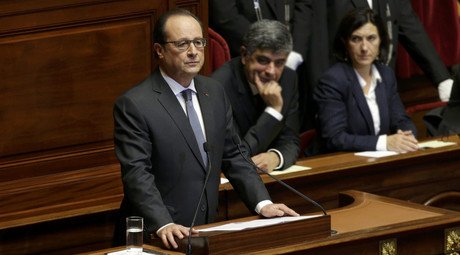Hollande scraps plan to strip convicted terrorists of French citizenship
French President Hollande says he will not push ahead with plans to change the constitution, after parliament failed to agree on the measure. If passed, the amendments would have allowed convicted terrorists to be stripped of their French nationality.
"Parts of the opposition have been hostile to a revision of the constitution. I deplore this attitude," Hollande said after a weekly cabinet meeting, as quoted by Reuters. "I have decided to end this debate."
It comes after months of heated discussions among lawmakers, with the far-right applauding the move, while the left deemed it a divisive measure.
Opponents of the proposal said it would create two classes of citizens – dual nationals who could be stripped of their French citizenship, and French citizens who could not. They claim the measure would contradict the principle of equality set out in the constitution.
Many said the measure would do little to prevent terror attacks, while others noted that it could make matters worse by stigmatizing sections of the population – including Muslims and people of North African descent – and pushing them into the hands of extremists.
Former Justice Minister Christiane Taubira resigned from her post, stating that she could not support the measure.
The president's plan to insert rules for the state of emergency in the constitution was also abandoned. The legislation would have given the president greater powers to declare a state of emergency without first asking for a vote in parliament.
Hollande initially unveiled the proposals in an address to parliament at the grand palace of Versailles just three days after the Paris terror attacks killed 130 people.
In order to have been passed, the same text of the constitutional change would have needed to be agreed upon by the National Assembly and the senate. However, the National Assembly approved on version in February, and the senate approved another version earlier this month.
Author and political scientist Jacques Sapir told RT that the Wednesday announcement signals a “defeat.”
“It's a defeat, not necessarily of the anti-terrorist policy, but certainly of Francois Hollande policy,” he said.
Sapir added that Hollande has "tried to capitalize on the terrorist attack of last November in Paris, and he has tried to unite both the right-wing and part of the left-wing of the electorate in an attempt to boost his popularity and to boost his position to be able to present himself at the next presidential election...but quite obviously he failed, and he failed for many reasons."
"The first one [is] the fact that he probably underestimated the amount of division both in the right and the left, and the second is that by a large margin, the text of the law has been very badly written,” Sapir said.
Hollande's approval ratings are nearing record lows ahead of the next presidential election, slated for spring 2017.













